Meet The Man Behind USA Football’s Hugely Popular “Football For Life” Series – Jason Johnson

An estimated 12 million viewers have already watched USA Football’s Football For Life Series so far and the number is skyrocketing.
So, as American Football International begins airing the first episodes of USA Football’s “Football For Life – China Edition” series this week, centered on the IFAF World U19 Championships held in China in 2016, let’s take a look at the man behind the series which has grabbed the interest of millions worldwide.
Writer, producer, director and cameraman Jason Johnson has not only become the “go to videographer” for USA Football, but now also works closely with ESPN, CBS and the NFL. Flying around the world with a camera strapped to his shoulder was not how he got in this game though. The players, coaches and team staff he works with find out pretty quickly that they are dealing with a consummate football professional.
Football For Life has captured worldwide interest
The first edition of the Football for Life series, which has been watched by an estimated 12 million viewers, followed the Long Beach Polytechnic High School football team during the 2015 season. The Jack Rabbits’ schedule was widely believed to be one of the toughest in the nation. Johnson’s documentary provides insight into what it takes for individual players to come together and become one of the best programs in the nation.
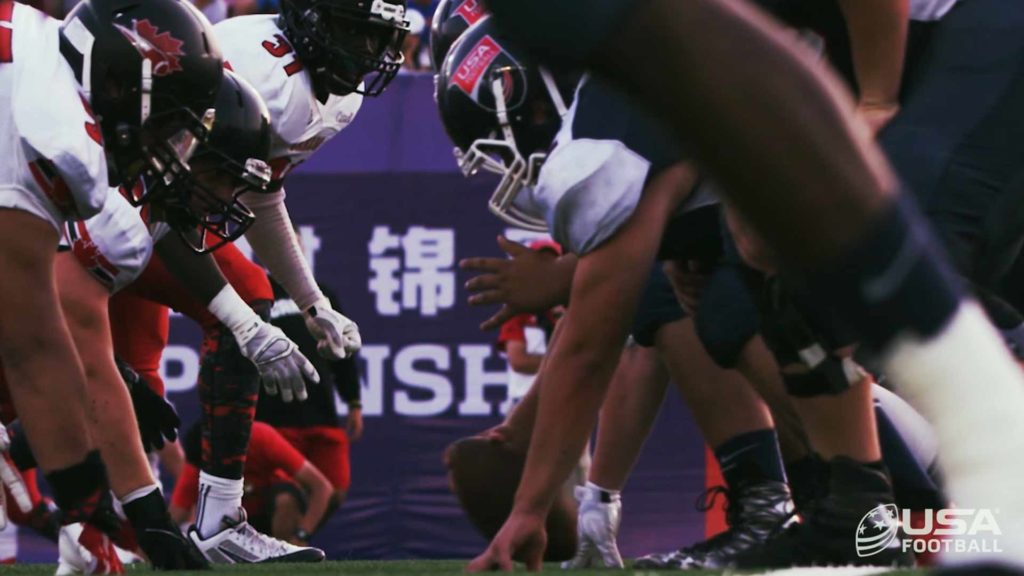
USA Football’s Football for Life China Edition depicts Team USA’s journey to China to compete in the U19 World Championships
The China edition follows Team USA on their quest to defend their U19 World Championship title in Harbin, China.
Jason Johnson is well traveled as a player and filmmaker
As a quarterback, Johnson has played and won championships both in North America and in Europe. First in college with the Arizona Wildcats and then the Canadian Football League with the Edmonton Eskimos. Finally he spent two years in Europe guiding first the Catania Elephants in Italy to the Italian semifinals and then leading Austria’s Swarco Raiders to the European title.
We asked Jason about his football background and how it opened the door to his other passion – filmmaking.
American Football International: How did you develop from being a QB on a Grey Cup winning team in the CFL to film director and producer?
Jason Johnson: I’ll be the first to admit that going from a quarterback to film director is not the most obvious of transitions, but the seeds for both have always been a part of me. Growing up, my first memories were playing football. My grandfather was the coach at Pacific Lutheran University, a Division 3 School about 15 minutes from our house (Frosty Westering, NCAA Hall of Fame and 9th winningest coach in College Football History).
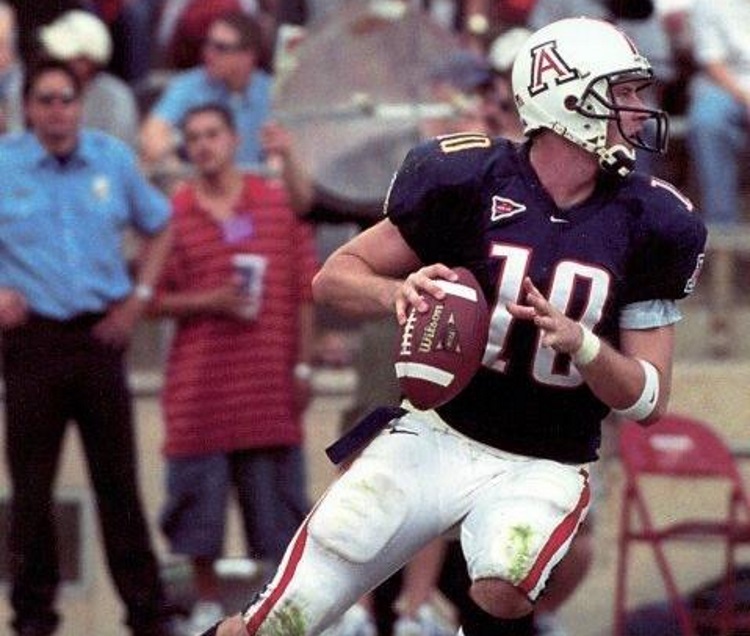
Jason Johnson looking downfield as QB for the Arizona Wildcats
I was a ball boy from about knee-high and our entire life was a mix of family and football. But I also loved making home movies and later got into photography. I spent hours watching NFL Films and of course ESPN. A graduation requirement of high school was a senior project, which I did on script writing and film editing in LA, and always knew it was something that I wanted to pursue. But it wasn’t until college – where I was playing QB at the University of Arizona – that the two paths collided. ESPN chose our team for a feature length documentary series called “The Season,” and as the starting QB I was one of the featured characters. I used this as my real-life internship, learning how they shot it, how they put the story together. I even went to LA for the editing. I knew instantly that this is what I wanted to do once I finished playing.
During my first year in the Canadian Football League, I formed a production company with my (future) wife, who was also in the business. We took on small projects at first, and then during my second year in the league, I directed an hour-long documentary on our team called “Inner Circle,” which was an homage to my grandfather who used that term to describe his team’s comradery. The show featured myself, three-time Grey Cup champ Ricky Ray, and Jason Maas, who went on to become Edmonton’s Head Coach. It aired on TSN (Canada’s ESPN) and was a big success, and our team happened to go on and win the Grey Cup that year. This launched my film career, and I knew once I was done playing that I would transition and do this full time.
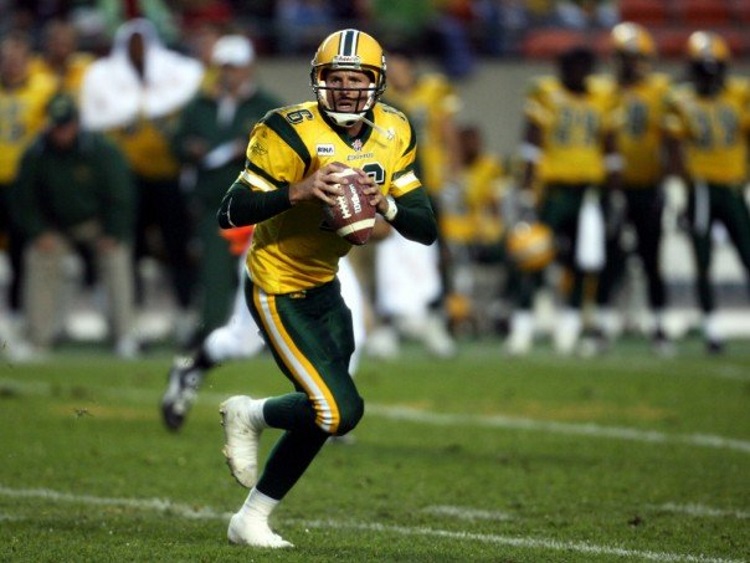
Johnson quarterbacking the Edmonton Eskimos in the Canadian Football League
AFI: You went on to win a Eurobowl title and played in Italy. Why did you finish your career there?
Johnson: The simple answer is a cliché – FOR THE LOVE OF THE GAME. My older brother was also a quarterback. He won a national championship at PLU for my Grandpa in 1999, and then went and played a season in Germany with the Schwabisch Hall Unicorns under Siegfried Gehrke. This was back when football in Europe was really developing. I saw the pictures, and heard the stories of things like “Training Camp in the Alps” and just knew that no matter where my career took me, I wanted to be sure to experience a season over there.
I had “retired” from the CFL at the ripe old age of 27 to pursue my video career and marketing, but after a year realized that I was in the best shape of my life and still wanted to play. I knew for sure that the country I wanted to play in was Italy because of the culture, and got connected with the Catania Elephants and Davide Giuliano. From our first Skype conversations I knew this was going to be a once in a lifetime experience.
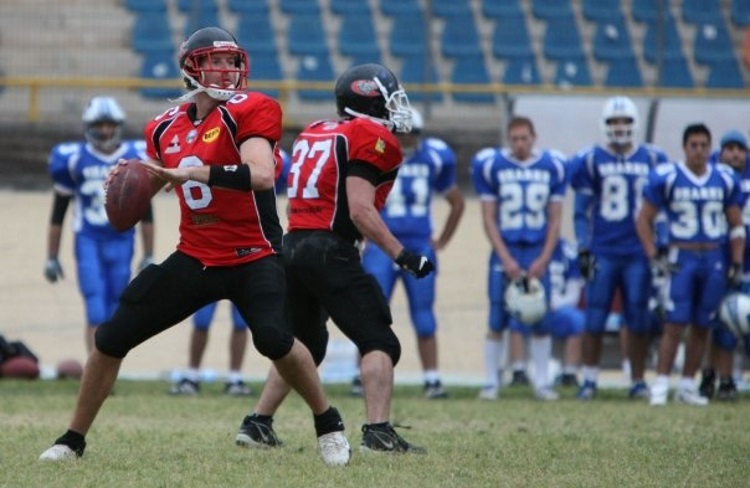
Johnson looking to throw for the Catania Elephants in Italy
My season with the Elephants is still what I consider to be my most fun football experience. We made such great friends there with the players, and being my own offensive coordinator was its own fun adventure. The games were crazy, and the times off the field even more so. We averaged 50 points a game and had a great season, making it to the IFL Semi-Finals where we lost to Bolzano.
I knew the experience couldn’t be duplicated again in Catania… and so if I had just been through the most fun I could have in Europe, then for my second season I wanted to find the most competitive situation I could find. My import receiver, Matt Epperson, and I signed with the Swarco Raiders Tirol in Austria, and we won the 2009 EuroBowl there. We arrived just in time to play with what I consider to be a legendary generation of Austrian players, guys who had helped build the league and are still making an impact there, guys like Florian Grein, Jakob Dieplinger, Mario Rinner, Andreas Proller, and such.
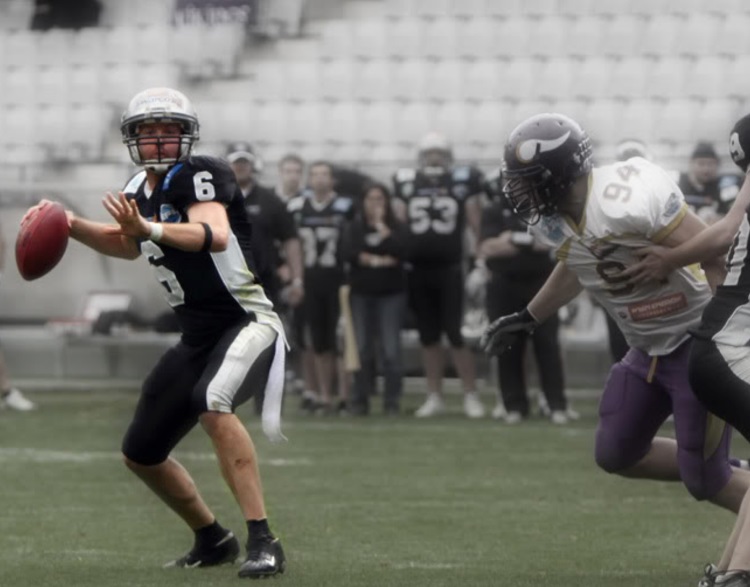
Johnson won the Eurobowl championship as QB for Austria’s Swarco Raiders
I’ll never forget my time in Europe, and it’s why I’m such a strong advocate for the game to this day.
AFI: Did you have filming aspirations at school?
Johnson: I touched upon my experience with ESPN during college – that’s really where I learned the craft of storytelling and the technical skills. Arizona didn’t offer a true ‘film program’ so instead I got a degree in Business Management – which may have had the biggest impact in helping me turn this into a true profitable profession and not just a hobby.
I’ve truly taught myself everything that I know. I approached this career just like my playing days – work as hard as possible, learn everything you can through resources like books and the internet, and most importantly, get MENTORS that can teach you how it’s really done. I’ve been lucky to meet some amazing people on my journey, and it’s those friends who have taught me the most about how to do what I do.
AFI: How did you find your way to USA Football?
Johnson: Coming back from playing in Europe, I had been away for nearly three years and thus it was like starting my business over from scratch. I actually didn’t really know where to start. So it was through various connections that eventually led me to IFAF, and an event in Austin, Texas called “USA vs. THE WORLD” which would later become the “International Bowl.”
I talked to people involved in the event, and I remember going to shoot this event FOR FREE and sleeping on the couch of IFAF’s only employee at the time, Jack Reed. But I was hungry. During my first 18 hours on the ground, I shot and turned around a quick web documentary about the game that caught USA Football’s eye, and I have been working with them ever since.
It’s been amazing to see them grow, and to have been able to tell a lot of their stories along the way.
AFI: How many football documentaries have you done?
Johnson: It’s hard to say exactly… but it’s a lot. I started by doing shorter documentaries with USA Football on many of their competitions and events. In 2011, I traveled back to Austria for the IFAF World Championships to document that tournament. The next year I went to Africa with IFAF/USA Football to document the growth of the game and launching the sport there.
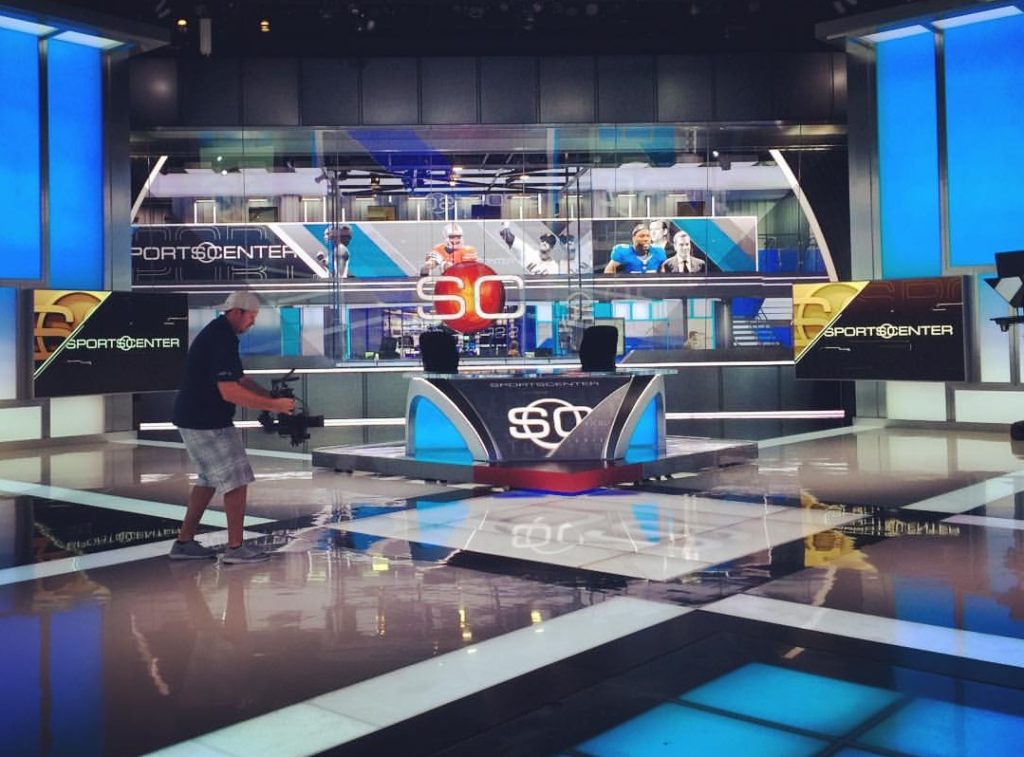
Filming the ESPN Sports Center set
In 2014, I began working with ESPN on their four-part mini series DRAFT ACADEMY which followed five NFL prospects from college through the draft process, and was the director of photography for that show again in 2015. It really was an incredible show and process, where we worked with Jameis Winston, Todd Gurley, Melvin Gordon, Blake Bortles, Jadeavon Clowney, and many others.
In 2016, I co-produced our own show MAKING OF A PRO: QB for CBS Sports Network telling the story of QB Guru George Whitfield, working with Cardale Jones, Connor Cook, and Stephen Rivers.
But perhaps the most personal has been working with USA Football to create and develop FOOTBALL FOR LIFE, an original series going inside high profile football programs. The inaugural season with Long Beach Poly High School drew over 12 million views. The third season was just released, featuring the US National Team’s journey to China for the U19 World Championship.
AFI: What triggered the trip to China?
Johnson: The story of USA Football’s National Teams Program is very interesting, and when it was announced that the 2016 U19 Championship was being held in China, we thought that could be a unique story. As the details for the event unfolded, we knew it was a great fit for our FOOTBALL FOR LIFE series, as there are many layers there – the story of the US Team and its players, the larger context of football in China, and then finally the growth of the game in general with seven different countries participating.
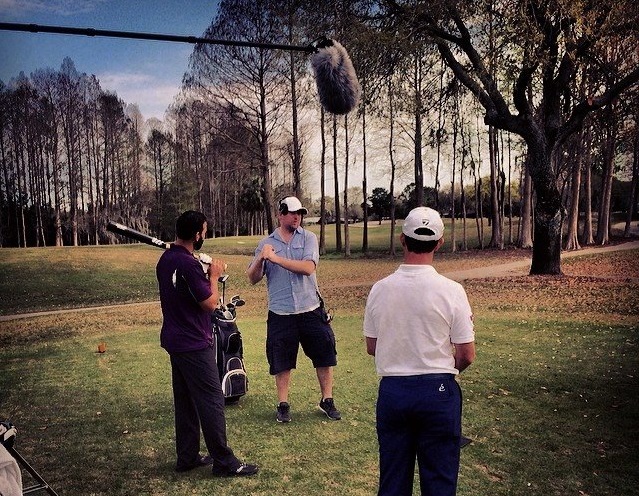
Johnson directing baseball player Jose Bautista and golfer Mike Weir for a scene
Being there definitely was a special feeling, and the country of China was endlessly fascinating. I’m happy how the documentary came out – where you really feel the passion of the players while getting a taste of the culture.
AFI: You have seen and documented the growth of football globally. What are your thoughts?
Johnson: It’s exciting to see the game continue to grow around the globe. I’ve witnessed first-hand the passion of the players in China, the dedication of the players in Europe, and the overall enthusiasm of anyone in a foreign land who has been bit by the ‘football bug.’ It’s not just a game but a life-style, and it’s so cool to see people connecting to the community of the game.
You see the game taking baby steps in different places – but I love to dream about where the game could be in 20, 30, 50 years. I would love to see it grow even faster, and hope to be involved in helping make that happen in any way I can.
AFI: What can be done better to develop the game?
Johnson: I have many thoughts on this subject. First of all, I think it’s important for clubs around the world to focus on developing the game at the YOUTH level. This doesn’t have to just be with tackle football – but also with flag football, skills camps, weight lifting, and just playing the game. The reason why you see Austria and Germany now dominating European football is because they have the strongest youth programs, and so when a player reaches the senior team he has been playing as long as the American Imports. We need to get many more clubs developing young players.

Johnson was as comfortable in front of the camera as he is behind it
Secondly, we need to continue to grow fan support and figure out a financial model to make the clubs financially stable and eventually profitable. This may be dipping too much into the business side of the game, but it’s tough for a team with little ticket revenue or sponsorship to pay foreign players and be able to afford travel, equipment, and the high costs of playing the game. It’s something college and pro teams in the U.S. take for granted, but for the game to grow to new heights internationally, then we need to see clubs be successful. It’s happened before with basketball, so the game just needs time.
Third, more international players must keep striving for the NFL. This helps attract higher level athletes to the game, and makes it more realistic for a player ANYWHERE in the world to think about making the NFL. Again, this has happened in Baseball and Basketball, so I think with each year this will improve.
Fourth – TECHNOLOGY. I think by everyone linking together via social media and websites such as AFI, there can be a standard across the board in regards to how the game should look and be played. Ten years ago, it would take a major TV deal to get a game on TV. Now the access to stream any game is literally at our fingertips. The sport must take advantage of technology.
Finally, we need to clean up the situation with IFAF. The game is not far enough along globally for there to be division and for people to act selfishly – everyone must be willing to do what’s in the best interest for the game. It’s actually embarrassing to anyone who has been involved in the game internationally to see this going on. There was such momentum a few years ago in regards to the growth of the game, and it feels in many ways that this has just stalled.
AFI: What are your plans?
Johnson: I currently have a number of projects in the works – football and otherwise – that are very exciting for 2017. My goal overall is to continue to make films that have an inspiring message, and eventually one day I want to transition from the documentary world to more of the feature films side of things. And of course, put all my effort into making sure my 6 week old son, Jax, makes the NFL.